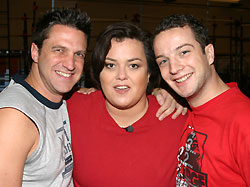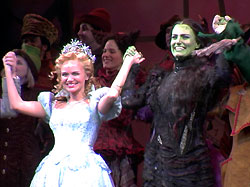Of course, when
producer-director Dori Berinstein documented an entire Broadway season,
she had no idea that what she was filming would be such a dramatic,
surprising and exciting year as 2003-2004 was. That was the season that:

Rosie O’Donnell decided to become a Broadway producer and dragged
across the Atlantic a modest little musical that had caught her fancy
in London. By and about Boy George, it was plainly marked
“Taboo,” but
she did it anyway, believing that, given her wealth and high public
profile, she could will the show into place. Unfortunately, she
had not figured on friction among the show’s creators that tied her
hands and doomed the project. Nor were matters helped by a hostile
press, which reported (sometimes gleefully) every backstage body-blow.
(One montage in the film flips through a blitzkrieg of bitchy
headlines, to the tune of Boy George’s plaintive lament, “Do You Really
Want To Hurt Me?”) Through it all, O’Donnell high-roaded it, even after
this ambitious caprice had devoured her whole $10 million investment.

A pleasant, if decidedly bizarre, little enterprise about puppets that
fornicate and have sexual-identity issues--
“Avenue
Q”--surfaced
Off-Broadway at the Vineyard Theater and, buoyed by a
better-than-average reviews, bolted for Broadway to try and make a go
of it there. As composer Robert Lopez notes in the film, “It started
out as a joke, sort of--puppets singing funny songs--and it turned into
something that actually has a heart.” An impish ad campaign kept
the show afloat until Tony time when it went into election-year
overdrive, urging voters in big red, white and blue lettering to “vote
with your heart.” Nobody thought it would work (and, in a sense, it
didn’t because Tony voters are not so simply swayed), but it turned out
to be--in one of the most startling Tony upsets ever--the little “Q”
that could. As producer Robyn Goodman so eloquently put it when she
picked up the prize for Best Musical: “It certainly doesn’t suck to be
us tonight.”

A veritable armada of deep-pocketed producers rallied behind the
commercial lost-cause called
“Caroline, or
Change” and brought it up
from The Public Theater downtown to Broadway, no doubt with dreams of a
Pulitzer dancing in their heads. Tony Kushner, its author, had, after
all, brought most of them the Pulitzer with his “Angels in America,” so
they were right to hope that lightning would strike twice. It didn’t
and closed at a loss after five struggling months, only to reopen again
in Los Angeles to rave reviews. It’s the show in which Tonya Pinkins
went Public again, resurfacing in the star spot after a bitter divorce
and child-custody battle sent her scurrying out of the limelight. An
act of personal courage, her performance of a black maid in backwoods
Louisiana of 1963 was bravura work and widely regarded as a shoo-in for
a Best Actress Tony. Again, it didn’t happen.

At a whopping $14 million (that looked it!),
“Wicked”
was the year’s
most expensive and anticipated musical event--so its stumble with
reviewers when it left the starting gate was doubly conspicuous, but
the paying customers quickly countered those critical yawns, and the
show has been raking in a million or more every week since opening. The
secret of its success? That it purports to be the backstory of The
Wicked Witch of the West from “The Wizard of Oz,” and audiences are
drawn like magnets to that beloved source by L. Frank Baum.
Sympathetically reinvented, that witch is named Elphaba after the
author’s initials and played lime-green by Idina Menzel, whose first
spray-painting (a ritual she endured for more than two years) is caught
here by the cameras. It was a bitter pill for “Wicked” to lose to
“Avenue Q,” which was capitalized at a quarter of the cost.
The making, unmaking, remaking and survival of these four musicals are
explored with remarkable candor in "ShowBusiness: The Road to Broadway," a feature-length
documentary which, because of the unprecedented cooperation its
creators received from the theater community, looms like the ultimate
in inside-Broadway movies. But this quartet hardly constitutes the
whole picture of the season. Punctuating the narratives of these shows,
pitched in like confetti, are other openings, other shows. The
2003-2004 stage season was also a time when:

Hugh Jackman took Broadway by storm, playing a fellow Aussie (the late
Peter Allen) in “The Boy From Oz” and doing it with such spectacular
panache and showmanship that he put the kibosh on the critical carping
about the musical’s bio-book. He never missed a performance and sold
out constantly. A Tony was the least the community could do.

In contrast, Donna Murphy set some kind of dubious record for poor
attendance because she was ailing during the re-run of “Wonderful
Town.” Eventually, the producers brought in as replacement Brooke
Shields, who--surprise, surprise--charmed the pants off critics.

Actresses of color completely dominated the Tony Awards--three blacks
and a green. Phylicia Rashad became the first African American to win
the Tony for Best Actress in a Play, and Audra McDonald became the
first to win four Tonys (a distinction she shares with Angela Lansbury
and Gwen Verdon). Both were cited for the Sean Combs-driven revival of
“A Raisin in the Sun.” A sleeper contender for Best Featured Actress in
a Musical, Anika Noni Rose, emerged victorious, but Tonya Pinkins who
played her mother didn’t come through as predicted, losing to that lady
in green, Idina Menzel.


In non-musical matters--and there were
nonmusicals on Broadway (not many and not nearly enough, but some)--it
was the first time that two Pulitzer Prize winners came up for the Best
Play Tony in the same year: Nilo Cruz’s “Anna in the Tropics” and Doug
Wright’s “I Am My Own Wife.” The winner was the latter, a one-man,
multi charactered, fact-based saga about Charlotte von Mahlsdorf (born
Lothar Berfelde), a gentle but resilient German transvestite who
survived both Nazi and Communist regimes. It was the first time a solo
work received the Tony for Best Play. Jefferson Mays, who executed all
of the roles, won the Best Actor prize. It was reported that when his
name came out of the envelope, Christopher Plummer (nominated for his
“King Lear”) exited in a huffy hurry.
That was the kind of year
it was, and wasn’t it – and aren’t we -- lucky to have Dori
Berinstein’s cameras around to catch it?
-- Harry
Haun